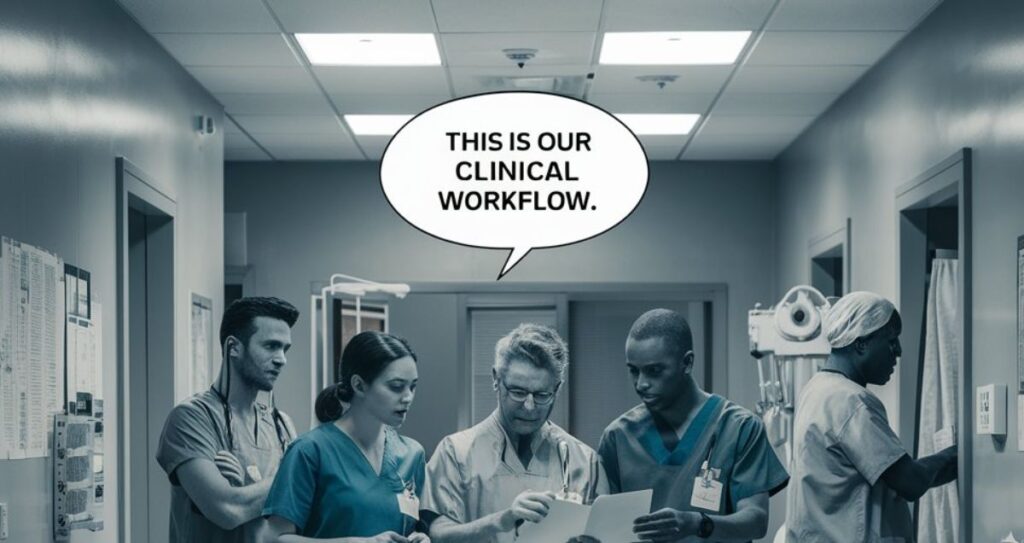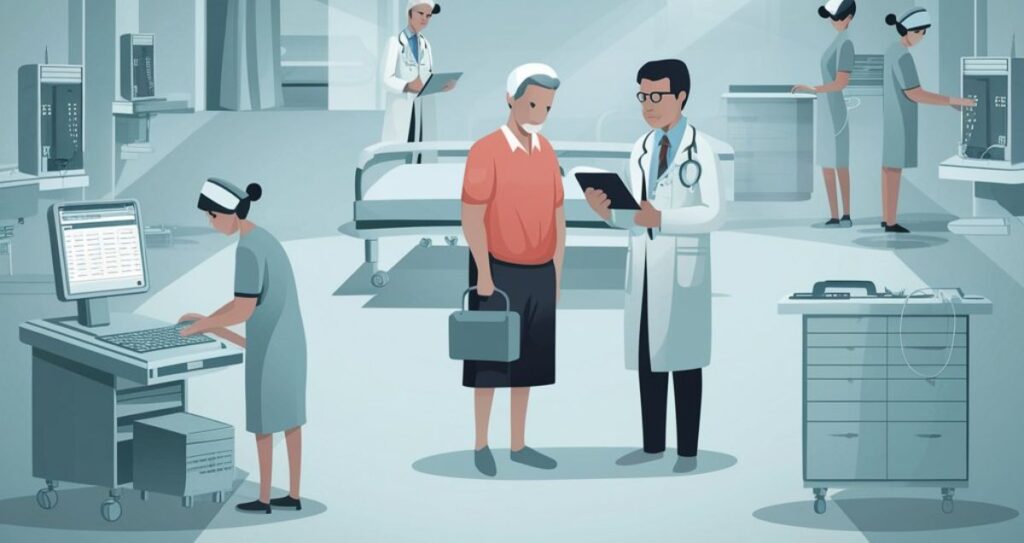What Is Clinical Workflow? to the use of artificial intelligence to optimize and automate processes in healthcare. It involves improving data management, diagnostics, and decision-making to enhance efficiency and patient outcomes.
Imagine a world where AI handles the paperwork, diagnoses patients faster, and predicts health outcomes before they happen. That world is here, transforming clinical workflows.
AI has become a game-changer in clinical workflows, making healthcare more efficient. From streamlining documentation to enhancing diagnostics, AI improves patient care, reduces errors, and speeds up processes.
The Role of AI in Clinical Workflows

Artificial intelligence introduces automation, machine learning, and predictive analytics into clinical workflows, reshaping how healthcare professionals perform their duties. Below are several key areas where AI has proven invaluable.
Data Management and Documentation
In a traditional workflow, clinicians spend a significant portion of their time on documentation and administrative tasks. With AI, this burden is reduced.
- Natural language processing (NLP) tools automatically transcribe doctors’ notes and analyze patient records.
- AI systems can help in sorting, tagging, and organizing medical documents, reducing the time spent on these tasks.
Case Study: In the Mayo Clinic, the integration of AI-powered data management tools resulted in a 30% reduction in documentation time for physicians. This allowed doctors to focus more on patient care rather than clerical tasks.
Diagnostic Assistance
AI systems are capable of analyzing complex datasets, such as medical imaging scans, lab results, and genetic data, far faster and with fewer errors than human professionals.
- AI algorithms can review radiology images for conditions like tumors or fractures, offering diagnostic suggestions to radiologists.
- AI-powered diagnostic tools provide real-time insights, reducing diagnostic delays and improving accuracy.
Case Study: A study published in Nature found that Google’s AI system was able to detect breast cancer with more accuracy than human radiologists, reducing false positives by 5.7% and false negatives by 9.4%.
Predictive Analytics for Patient Outcomes
AI uses machine learning to identify patterns in patient data, enabling predictive models that forecast patient outcomes, risk factors, or potential complications.
- Predictive algorithms can assess a patient’s risk of hospital readmission or their likelihood of developing certain conditions, allowing for early intervention.
Fact: According to a report by Accenture, AI-based predictive analytics could help prevent over 20% of hospital readmissions.
AI-Powered Tools for Clinical Workflows
To truly understand the potential of AI, it’s important to look at the various tools and technologies being used.
| Tool | Function | Impact on Workflow |
|---|---|---|
| Natural Language Processing (NLP) | Automates documentation, transcribes medical notes | Reduces administrative burden |
| Machine Learning Algorithms | Predict patient outcomes based on historical data | Enhances personalized treatment plans |
| Robotic Process Automation (RPA) | Handles repetitive tasks like appointment scheduling | Increases efficiency in operational workflows |
| AI Imaging Systems | Analyzes X-rays, MRIs, CT scans | Improves diagnostic accuracy |
These tools can be implemented in various stages of patient care, from early diagnosis to post-treatment monitoring. Each plays a role in enhancing the What Is Clinical Workflow? through automation, improved accuracy, and faster data processing.
Benefits of AI in Clinical Workflows
The integration of AI into clinical workflows offers a wide array of benefits. These improvements translate directly into better patient care, operational efficiency, and overall healthcare quality.
Increased Efficiency
AI streamlines time-consuming processes like documentation, scheduling, and data entry, allowing clinicians to focus more on patient care.
Fact: A study by Stanford Medicine found that using AI for administrative tasks led to a 20% increase in patient throughput.
Improved Patient Outcomes
AI’s ability to analyze large datasets and predict patient outcomes means earlier interventions and personalized treatment plans.
- Personalized Medicine: AI can tailor treatments to individual patients based on their genetic, demographic, and lifestyle data.
- Early Diagnosis: By identifying high-risk patients earlier, AI systems facilitate faster treatments.
Cost Reduction
AI reduces operational costs by automating labor-intensive tasks and improving resource allocation.
- AI-powered systems can manage inventory and ensure that medical supplies are ordered only when needed.
- Predictive analytics reduces unnecessary tests and treatments by providing accurate initial diagnoses.
Challenges and Considerations

Despite its potential, the integration of AI into clinical workflows is not without challenges.
Data Privacy and Security
The use of AI in healthcare requires handling vast amounts of sensitive patient data, raising concerns about data breaches and privacy.
- Ensuring compliance with regulations like HIPAA (Health Insurance Portability and Accountability Act) is critical.
High Implementation Costs
While AI reduces costs in the long run, the initial investment in AI technologies can be high. Many healthcare facilities, especially smaller clinics, may struggle with the financial burden of adopting these systems.
- Fact: According to Deloitte, the global AI healthcare market is expected to reach $45.2 billion by 2026, driven primarily by larger healthcare systems.
Case Study: AI in Clinical Workflows at Mount Sinai Hospital
At Mount Sinai Hospital in New York, AI was introduced to streamline What Is Clinical Workflow? in their emergency department (ED). Their AI tool helped prioritize patient cases based on severity and predict which patients were likely to need intensive care.
- Results:
- 15% reduction in ED waiting times.
- 25% improvement in patient throughput.
- Enhanced decision-making for triage nurses.
This case demonstrates how AI can revolutionize patient flow in high-pressure environments like emergency departments.
Future of AI in Clinical Workflows
Looking ahead, the future of AI for clinical workflows promises even more innovation. Researchers are developing AI-driven surgical robots and virtual health assistants, while ongoing improvements in machine learning algorithms will only enhance the capabilities of AI in clinical settings.
Key future trends include:
- AI in Remote Monitoring: Wearable devices and AI will work together to monitor patients outside the hospital, alerting clinicians to changes in condition in real-time.
- AI in Precision Medicine: The combination of AI and genomics will lead to more targeted therapies, improving the effectiveness of treatments.
Conclusion
Artificial intelligence is transforming clinical workflows by making healthcare more efficient, accurate, and patient-centric. From reducing documentation time to improving diagnostic accuracy, AI is revolutionizing how healthcare professionals work and how patients are treated. As AI technology continues to evolve, its role in healthcare will only expand, leading to even more personalized, data-driven care for patients.
By embracing AI, healthcare providers can deliver better outcomes while simultaneously reducing costs and streamlining operations. What Is Clinical Workflow? isn’t just a trend; it’s a fundamental shift toward a smarter, more efficient healthcare system.
David Mark is a tech and science enthusiast and the writer behind TechNsparks. With a passion for innovation and discovery, David explores the latest advancements in technology and scientific research. His articles provide insightful analysis and engaging commentary, helping readers stay informed about cutting-edge developments. Through TechNsparks, David aims to make complex tech and science topics accessible and exciting for everyone.
